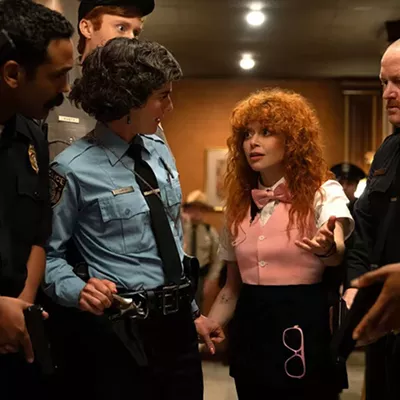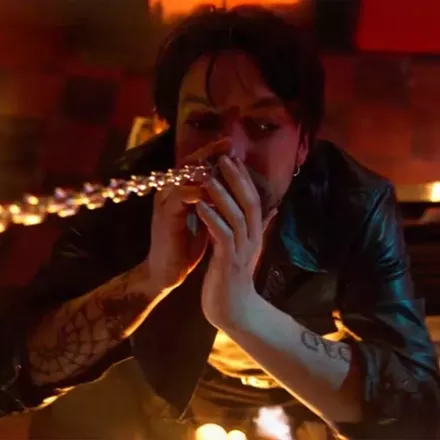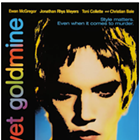For the past decade or so, the director of V for Vendetta, James McTeigue, has been cutting his teeth as assistant director on projects such as all three Matrix films, Star Wars: Episode II -- Attack of the Clones and Dark City. Based on what he's come up with in his first outing as full-fledged director, that was some mighty good practice.
V for Vendetta, taken from the two-decade-old series of comics by Alan Moore and David Lloyd, is a gigantic film, made with care and flair. It completely envelops anyone watching it in the world of the not-too-distant future -- a troubling place that, frighteningly, doesn't feel too far-fetched.
With the main story set in a fascist-ruled London of 20 or 30 years from now, this actually starts in the early 1600s, when political rabble-rouser Guy Fawkes was one of the leaders of a plot to blow up Parliament (listen to the John Lennon song "Remember" before seeing the film). When Fawkes was caught, on Nov. 5, 1605, before the bombs in Parliament's cellar could be set off, he is reported to have said (this is not in the film) that he planned it because "a dangerous disease required a desperate remedy."
Jump forward to tomorrow's London, where a man dressed in black, wearing a long wig and a Guy Fawkes mask, is attempting to pick up where Fawkes left off. He is a citizen who despises what the government has become. There are mentions of the "former United States," as well as a war and a plague, and this man believes that the government -- headed, Big Brother-style, by High Chancellor Sutler (a feverish John Hurt) -- is, indeed, a dangerous disease that requires a desperate remedy.
In the story, not a lot is known about this mystery man, who calls himself V. He keeps his face covered by the mask because he's a victim of hideous burns. He is well-read and quotes regularly from Shakespeare. He enjoys using words with a flourish, and in one spectacularly written speech, starts almost every one of them with the letter V. He's also strong and agile, and is an expert swordsman, unafraid to use his blades to inflict death to those he deems to deserve it.
Late one Nov. 4 evening, he meets and rescues a damsel in distress named Evey (Natalie Portman). Then he charms her into attending a midnight (Nov. 5) "concert" with him. But it's more of a fireworks display, with accompanying destructive explosions. And that's only the beginning of both V and Evey's offbeat relationship: V is on a quest to get his fellow countrymen to rise up against its power-hungry, quite mad leaders. Breaking into a broadcast studio, he asks the TV-addicted populace to join him exactly one year later, en masse, at the Parliament building. They'll know what to do.
He's labeled a terrorist, and the cops, with Chief Inspector Finch (Stephen Rea) in charge, begin trying -- to no avail -- to track him down.
Played under the mask and wig by Hugo Weaving (Agent Smith in the Matrix films, but with a totally different approach to his voice here), V can also be a very gentle man. He comforts Evey when he finds out about her difficult past, and coaxes her into watching his favorite movie -- the 1934 Robert Donat-starring The Count of Monte Cristo -- with him. Yet all through this, she is a captive in his underground lair -- for, he reasons, her own safety.
As a character study, the film has many people to play with. Small bits about V's background are eventually revealed, and neither they, nor he, are very pleasant. Evey carries a heavy load on her back. The Chancellor is a horrific, dastardly animal. Inspector Finch is a very decent man, as is one of Evey's pals, Deitrich (Stephen Fry), who is an art lover (a crime likely punishable by death).
The fingerprints of the creators of The Matrix, Andy and Larry Wachowski, are all over this film, and as writers, they've done a remarkable job keeping the mood, textures, flavor and story of the comics intact -- as have director McTeigue and cinematographer Adrian Biddle (The World Is Not Enough, The Mummy, Aliens).
The sprawling story soon reaches V's one-year date, when he hopes to bring chaos to the streets. In the final hour before the clock chimes midnight, there's a finely wrought, quite vicious and very stylized fight, followed by some well-placed turns in the plot.
With musical bookends of a familiar and fitting piece of Tchaikovsky music, the film gives us both a slick and wild entertainment and a thought-provoking damnation of politics gone awry. A great piece of dialogue delivered by V sums it up: "People should not be afraid of their governments -- governments should be afraid of their people."
V for Vendetta; Rated PG-13; Directed by James McTeigue; Starring Natalie Portman,Hugo Weaving, John Hurt
















